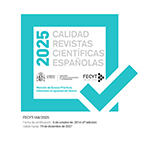El efecto de los factores demográficos y económicos en el voto a la izquierda populista de América Latina
Resumen
Pese al papel central del populismo en la política y la democracia de América Latina, es muy poco lo que sabemos sobre los rasgos y motivaciones individuales de quienes apoyan al populismo en dicha región. El giro a la izquierda que caracterizó a la etapa contemporánea del populismo latinoamericano, junto al contexto de desigualdad y subdesarrollo de varios de los países gobernados por líderes populistas, ha llevado a buena parte de la literatura a analizar la movilización populista desde una perspectiva económica y de clase. ¿Hasta qué punto el perfil del electorado populista latinoamericano responde a este llamado? Para dar respuesta a esta pregunta analizamos las características socioeconómicas y demográficas de los votantes de seis líderes populistas de izquierda de este período: Evo Morales, de Bolivia; Marco Enríquez-Ominami, de Chile; Rafael Correa, de Ecuador; Andrés Manuel López Obrador, de México; Ollanta Humala, de Perú; y Nicolás Maduro, de Venezuela. Los resultados demuestran que, si bien la insatisfacción por las desigualdades materiales importa, los votantes de la izquierda populista latinoamericana no son necesariamente masas desprovistas y manipulables, sino que responden a una identidad mucho más compleja.
Descargas
Descarga artículo
Licencia
La revista Política y Sociedad, para fomentar el intercambio global del conocimiento, facilita el acceso sin restricciones a sus contenidos desde el momento de su publicación en la presente edición electrónica, y por eso es una revista de acceso abierto. Los originales publicados en esta revista son propiedad de la Universidad Complutense de Madrid y es obligatorio citar su procedencia en cualquier reproducción total o parcial. Todos los contenidos se distribuyen bajo una licencia de uso y distribución Creative Commons Reconocimiento 4.0 (CC BY 4.0). Esta circunstancia ha de hacerse constar expresamente de esta forma cuando sea necesario. Puede consultar la versión informativa y el texto legal de la licencia.











